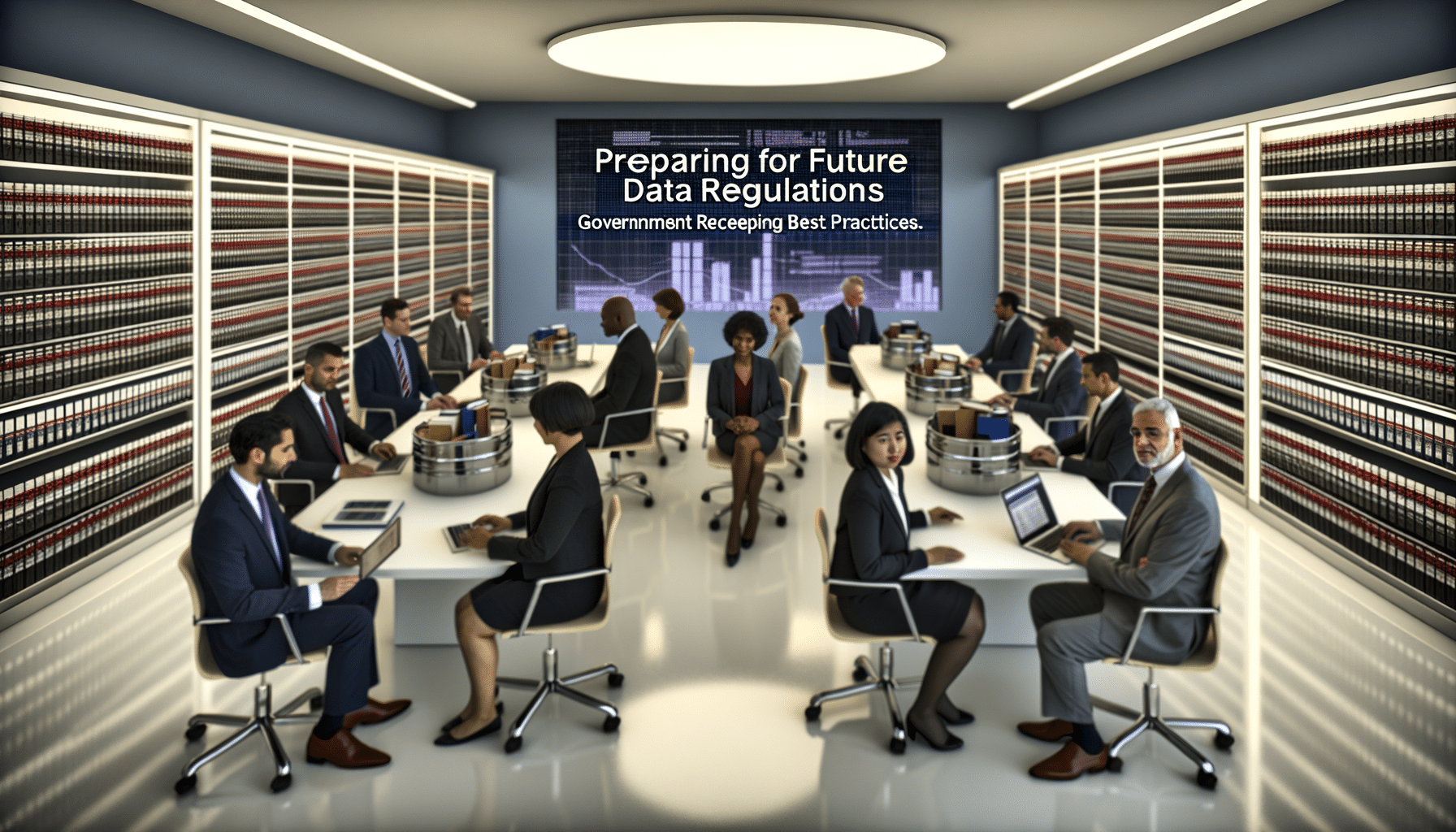- Regulatory Planning
- July 18, 2024
Preparing for Future Data Regulations: Government Record Keeping Best Practices

In an era where data is the new oil, government agencies are increasingly under pressure to not only manage their records efficiently but also to comply with ever-evolving regulations. Anticipating future regulations is no easy task, but doing so is crucial for maintaining public trust and operational integrity. Having overseen RecordsKeeper.AI’s transformative journey, I’ve gathered some strategies that might help governmental bodies stay ahead of the curve in their record-keeping processes.
Embracing an Evolving Regulatory Landscape
The regulatory environment is one of constant change, with emerging laws aimed at privacy, security, and transparency. With future regulations likely to become more stringent, government departments must adopt adaptive strategies for record management. Implementing agile systems that can evolve with legislative changes ensures compliance is not a one-off exercise but a continuous, forward-thinking approach.
Automated Records Classification
Manual categorization is not only time-consuming but prone to human error. This is where automated categorization, a key feature of RecordsKeeper.AI, can be a game-changer. AI-powered tools allow records to be classified and tagged automatically, making them easily accessible via natural language queries. This not only streamlines retrieval but also ensures accurate categorization in line with new and existing regulatory requirements.
Security as a Paramount Concern
The stakes for government records are exceptionally high due to their inherent sensitivity and public importance. Harnessing secure data rooms with controlled access and real-time activity tracking is pivotal to protecting these records from unauthorized access and breaches. As we tackle future regulations, focusing on robust security measures will be fundamental in safeguarding governmental data.
Charting Compliance Management Paths
Compliance is a dynamic process, not a static milestone. Automation plays a pivotal role in managing regulatory workflows, ensuring adherence to industry standards such as GDPR, HIPAA, and SOX. By automating these workflows, departments can minimize human error and allocate their workforce to tasks that require critical thinking and human insight.
Ensuring Data Integrity Through Blockchain
Data integrity remains a focal point for governmental record-keeping. Blockchain technology offers a reliable solution with immutable, tamper-proof records that safeguard sensitive information from unauthorized alterations. By integrating such cutting-edge technology, organizations can assure stakeholders of the authenticity and reliability of their data, preparing themselves for stricter future regulations.
Regular Backups and Swift Recovery Protocols
To protect against potential data loss, implementing regular automatic backups, coupled with rapid recovery options, is critical. This method not only aligns with current compliance directives but also positions departments favorably against future obligations that may require more rigorous disaster recovery strategies.
Policy Management: The Backbone of Future-proof Systems
Data retention and deletion policies are crucial elements of compliant record management systems. Automating these policies ensures that records are preserved and purged according to legal requirements, sparing departments the repercussions of non-compliance. Investing in thorough, automated policy management today will no doubt pay dividends when future regulations emerge.
The Importance of Audit Logs & Reports
Maintaining detailed activity logs and generating audit-ready reports are not just regulatory prerequisites but vital components of transparent governance. By keeping comprehensive audit trails, organizations can provide accountability assurances and build trust with stakeholders, which will become ever more critical as new regulations take shape.
Conclusion: Strategize Today for Tomorrow’s Challenges
Future regulations may be daunting, but they also provide an opportunity to reimagine the possibilities of efficient and compliant record management. By deploying the right technological solutions and strategies today, government agencies can not only meet current requirements but be well-prepared for the demands of tomorrow. For those eager to dive deeper into the world of advanced record management, I invite you to explore the offerings and insights available through RecordsKeeper.AI. Feel free to reach out or follow my journey as I continue to navigate these exciting challenges.
Toshendra Sharma is the visionary founder and CEO of RecordsKeeper.AI, spearheading the fusion of AI and blockchain to redefine enterprise record management. With a groundbreaking approach to solving complex business challenges, Toshendra combines deep expertise in blockchain and artificial intelligence with an acute understanding of enterprise compliance and security needs.
Archives
- January 2025
- December 2024
- November 2024
- October 2024
- September 2024
- August 2024
- July 2024
- June 2024
- May 2024
- April 2024
- March 2024
- February 2024
- January 2024
- December 2023
- November 2023
- October 2023
- September 2023
- August 2023
- July 2023
- June 2023
- May 2023
- April 2023
- March 2023
- February 2023
- January 2023
- December 2022
- November 2022
- October 2022
- September 2022
Want to get more content like this?
Signup to directly get this type of content to your inbox!!
Latest Post
Document Control for Equipment Maintenance
- January 20, 2025
Managing Records for Multiple Clients
- January 19, 2025
Handling Conference Documentation
- January 18, 2025
Setting Up Department Record Reviews
- January 17, 2025





